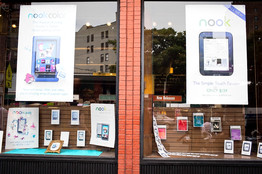It’s time to say “Goodbye” to Borders. And, like the quote from T.S. Eliot, the bookstore giant seems to be ending, “not with a bang, but with a whimper.”
 It began with a glad cry, at least on the part of a lot of book lovers. I remember when the first Borders opened in the Chicago exurbs. At that time, probably in the early 1990s, it was fantastic! There were truly marvelous bookstores in downtown Chicago at that time (the late, lamented Kroch’s and Brentano’s on Wabash comes to mind) but way out in the ‘burbs, the only bookstores were Walden’s and B.Dalton’s. If you wanted the best sellers, they were fine, but for a genre reader, they always left something to be desired. For true discovery, or simply just to browse for hours in utter contentment, an expedition downtown was required. Downtown Chicago meant an hour driving each way, navigating traffic, paying for parking, etc., etc. It could be done, but it required some planning. It was an expedition.
It began with a glad cry, at least on the part of a lot of book lovers. I remember when the first Borders opened in the Chicago exurbs. At that time, probably in the early 1990s, it was fantastic! There were truly marvelous bookstores in downtown Chicago at that time (the late, lamented Kroch’s and Brentano’s on Wabash comes to mind) but way out in the ‘burbs, the only bookstores were Walden’s and B.Dalton’s. If you wanted the best sellers, they were fine, but for a genre reader, they always left something to be desired. For true discovery, or simply just to browse for hours in utter contentment, an expedition downtown was required. Downtown Chicago meant an hour driving each way, navigating traffic, paying for parking, etc., etc. It could be done, but it required some planning. It was an expedition.
Borders brought a real, total, complete bookstore, with the depth of Kroch’s, or close enough, within 15 minutes. And free parking. I could stop by whenever I wanted. It was bliss. If I found a book I liked, and it was part of a series, they usually had the whole series. Rack upon rack of magazines, in all kinds of esoteric subjects. Borders represented the instant gratification of this biblioholic’s desires, transplanted to suburbia.
 But the bloom fell off the proverbial rose. Barnes & Noble moved in down the street. In many cases, quite literally. Just like Walgreens moves in near CVS or Rite-Aid, and Safeway opens its grocery chain across from the Kroger’s or the Publix, B&N moved in near Borders. But B&N learned from Borders and outdid them. The B&N built a bigger parking lot. Or picked a location with slightly better traffic. And Barnes & Noble started a discount program. Borders never seemed to figure out how good an idea that was. Instead, Borders dropped the loyalty programs that B.Dalton’s and Walden’s used to have. B&N picked up goodwill, and Borders started generating badwill. The snowball began its slide down the hill.
But the bloom fell off the proverbial rose. Barnes & Noble moved in down the street. In many cases, quite literally. Just like Walgreens moves in near CVS or Rite-Aid, and Safeway opens its grocery chain across from the Kroger’s or the Publix, B&N moved in near Borders. But B&N learned from Borders and outdid them. The B&N built a bigger parking lot. Or picked a location with slightly better traffic. And Barnes & Noble started a discount program. Borders never seemed to figure out how good an idea that was. Instead, Borders dropped the loyalty programs that B.Dalton’s and Walden’s used to have. B&N picked up goodwill, and Borders started generating badwill. The snowball began its slide down the hill.
 The pattern repeated itself when bookselling moved online. Amazon became the world’s, possibly the universe’s, biggest bookseller. Barnes & Noble started their own online bookstore. Amazon discounts books sold online. B&N’s in-store discount program is also applicable online. What did Borders do? They gave away their online bookselling to Amazon. They gave away their future. And so they are gone
The pattern repeated itself when bookselling moved online. Amazon became the world’s, possibly the universe’s, biggest bookseller. Barnes & Noble started their own online bookstore. Amazon discounts books sold online. B&N’s in-store discount program is also applicable online. What did Borders do? They gave away their online bookselling to Amazon. They gave away their future. And so they are gone
 Now the future is in ebooks and online sales. Amazon sells more ebooks than it does print books of all kinds, paperback or hardcover. So does B&N. Barnes & Noble is Amazon’s remaining challenger in the bookselling marketplace. And is it any wonder that B&N’s CEO works from the headquarters of barnesandnoble.com, and not from the old, traditional headquarters of the bookstore division that all of his predecessors have used? The future is in selling many more bits than books.
Now the future is in ebooks and online sales. Amazon sells more ebooks than it does print books of all kinds, paperback or hardcover. So does B&N. Barnes & Noble is Amazon’s remaining challenger in the bookselling marketplace. And is it any wonder that B&N’s CEO works from the headquarters of barnesandnoble.com, and not from the old, traditional headquarters of the bookstore division that all of his predecessors have used? The future is in selling many more bits than books.









a point of fact. Waldenbooks had the genre loyalty programs til the late 80s when they introduced the Preferred Reader card which was a discount card–shortly before Borders bought them. Management eventually did away with the card (early 2000s?) but while it was there, it was reasonably popular. Cheaper than b&n’s (only $10/yr). Well, popular except amongst the employees who were required to sell a certain amount of them per # of transactions or risk being fired for performance issues…
For me, as a Waldens worker at the time (89-94 or so) the bigger problem was the change in priorities that seemed to dovetail with Borders taking over the company. The attitude shift was to hiring salespeople, not book people. One district manager was heard to say “I can teach salespeople book. I can’t teach book people sales.” They truly didn’t understand the service efficiencies you get when you have workers who are so intimately familiar with the stock that they can occasionally recite an ISBN from heart. And how much buyers respond to sellers like that.
It’s interesting that as they went to that model, moving away from hiring people who really loved and knew and read books, that sales slumped and many of our longtime passionate purchasers, the people who were in several times a week, deserted the store. They weren’t interested in salespeople either, they wanted book people.
So not a lot of love lost for Borders, here. I’m sorry for all the bookpeople who managed to hold on through those lean years and are now out of jobs, but whoever those management types were that thought book sales could be handled the same as canned goods? You drove it into the ground, and you, I don’t mourn at all.